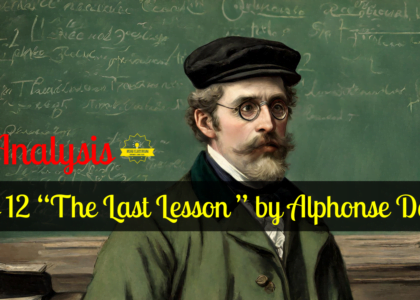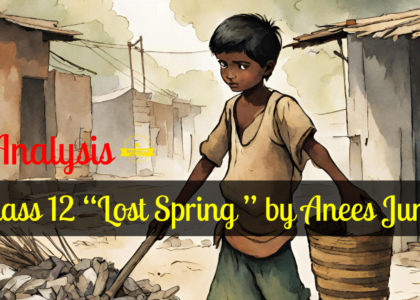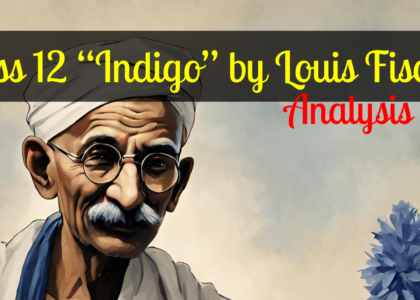“Interview-Part II” Summary, Theme, Important Lines, Textbook Exercises, Extra Questions and MCQs/PYQs
Table of Contents:
Also Read: Class 12– Interview (Part 1)
Vocabulary:
- Formidable: Inspiring fear or respect through being impressively large, powerful, intense, or capable.
- Semiotics: The study of signs and symbols and their use or interpretation.
- Aesthetics: A branch of philosophy that deals with the nature of beauty, art, and taste and the creation and appreciation of beauty.
- Superstardom: The state or condition of being extraordinarily famous or successful, especially in the entertainment industry.
- Interstices: Small spaces or gaps between objects or within structures.
- Depersonalized: Lacking in individuality or personal character.
- Dissertation: An extended essay on a particular subject, especially one written as a requirement for the Doctor of Philosophy degree.
- Seminal: Strongly influencing later developments.
- Metaphysics: The branch of philosophy deals with the first principles of things, including abstract concepts such as being, knowing, substance, cause, identity, time, and space.
- Yarn: A long, often elaborate narrative of actual or fictitious adventures; an entertaining tale.
- Cathedral: The principal church of a diocese, containing the bishop’s throne.
Summary “Interview-Part II“:

In the excerpt from an interview conducted by Mukund Padmanabhan from The Hindu with Umberto Eco, he talks about his career as a scholar and novelist. Eco reflects on his philosophy and approach to writing, emphasising the narrative aspect he incorporates into his scholarly essays.
He also shares insights into his transition from academia to fiction writing, noting that he began writing novels later. Despite his extensive scholarly output, Eco acknowledges that he is often primarily recognised as a novelist.
The conversation also touches upon the unexpected success of his novel “The Name of the Rose” and the reasons behind its popularity, attributing it partly to its exploration of medieval history and mystery.
Theme “Interview-Part II“:
The excerpt from the interview with Umberto Eco revolves around the multifaceted nature of his identity and work, juxtaposed with the perceptions and expectations of the audience and the industry. As an interview, it is a communication genre that delves into the author’s thoughts, experiences, and reflections.
Key themes explored in the excerpt include:
- Identity and Versatility: Eco ponders his identity as a renowned university professor and novelist. Though he has made significant contributions to academia, people recognise him mainly as a novelist, which intrigues and bothers him to some extent.
- The Creative Process: Eco’s writing approach emphasises narrative style, which stems from his early experiences presenting his doctoral dissertation. His belief in storytelling as a powerful tool for communication and expression led him to write scholarly works with a narrative aspect and later venture into novel writing.
- Audience and Perception: The interview discusses the popularity of Eco’s works, including “The Name of the Rose.” Eco challenges the idea that readers only want accessible experiences and shows that depth can captivate audiences. Despite tackling complex subjects, Eco’s success highlights the diversity of readers’ interests and the unpredictability of literary success.
- Mystery and Chance: Eco ponders the unexpected success of “The Name of the Rose”, attributing it to its exploration of medieval history and enigmatic narrative appeal. He emphasises the mystery surrounding the book’s popularity, suggesting that timing and circumstance played significant roles in its reception.
The interview excerpt provides insights into Eco’s intellectual journey, his views on writing and storytelling, and the complexities of engaging with diverse audiences within literature and academia. As a communication genre, the interview is a platform for Eco to share his perspectives and experiences, offering readers a deeper understanding of his multifaceted identity as a scholar and novelist.
Important Lines- “Interview- Part II”:
1. “Maybe I give the impression of doing many things. But in the end, I am convinced I am always doing the same thing.”: Umberto Eco suggests that despite engaging in various activities, he believes they all serve a common purpose or reflect a unified set of interests and values. This statement highlights the underlying consistency and coherence in his diverse pursuits, whether academic, literary, or philosophical.
2. “Similarly, we have a lot of empty spaces in our lives. I call them interstices.”: Eco metaphorically refers to the gaps or empty moments in our lives as “interstices.” He views these intervals not as wasted time but as opportunities for productivity and creativity. By utilising these otherwise idle moments, Eco implies that significant work can be accomplished, such as writing an article while waiting for an elevator.
3. “Scholars learn a lot of a certain subject, then they make a lot of false hypotheses, then they correct them and at the end, they put the conclusions. You, on the contrary, told the story of your research.”: Here, Eco contrasts traditional scholarly writing with his approach, which he characterises as narrative-driven. He emphasises the importance of storytelling in academic writing, suggesting that presenting research as a narrative, complete with trials and errors, can be more engaging and effective than the conventional method of presenting conclusions.
4. “I consider myself a university professor who writes novels on Sundays.”: This statement reflects Eco’s self-perception and priorities. Despite his immense success as a novelist, he identifies primarily as an academic and values his affiliation with the academic community. His reference to writing novels on Sundays highlights the secondary nature of his fiction-writing endeavours compared to his academic pursuits.
5. “But it is exactly these kinds of readers who don’t want easy experiences. Or at least don’t always want this.”: Eco discusses the reading preferences of his audience, suggesting that readers who appreciate his novels are not seeking simplistic or easy experiences. He acknowledges that while there is a time and place for leisurely activities like watching television, many readers crave intellectual stimulation and are drawn to complex narratives that challenge them intellectually.
6. “I think the success of the book is a mystery. Nobody can predict it.”: Eco humbly admits that the phenomenal success of his novel “The Name of the Rose” defies easy explanation. Despite attempts to analyse its popularity in terms of its historical setting or thematic content, Eco maintains that the book’s success remains untouchable and unpredictable. This acknowledgement highlights the unpredictable nature of literary reception and the multifaceted factors that contribute to a work’s popularity.
Textbook Question/Answers- “Interview- Part II”:
Understanding The Text:
Q1: Do you think Umberto Eco likes being interviewed? Give reasons for your opinion.
A1: Umberto Eco likely enjoys being interviewed to some extent, evident from his engagement with philosophical ideas, use of storytelling, humour, and willingness to share personal anecdotes. However, he may also find interviews challenging due to balancing personal and intellectual aspects, managing public perception, and navigating personal boundaries, especially given his preference for academic circles over public appearances.
While Eco appreciates the dialogue, complexities in his feelings about being interviewed arise from his personality, professional background, and the nature of the conversation.
Q2: How does Eco find the time to write so much?
A2: Umberto Eco finds time to write extensively by utilising what he terms “interstices” or empty spaces in life. He mentions waiting for an elevator and engaging in writing activities. Eco’s ability to seize upon these moments allows him to make productive use of what might otherwise be considered downtime.
His dedication to writing, particularly on Sundays, demonstrates his commitment to his craft despite his busy schedule as a professor and scholar.
Q3: What was distinctive about Eco’s academic writing style?
A3: Umberto Eco’s academic writing style was distinctive in its narrative approach and personal engagement. Unlike conventional scholarly works that often maintain a depersonalised and dry tone, Eco incorporated storytelling elements and shared his research journey, including trials and errors.
This narrative aspect made his academic writings more accessible and engaging to readers. Eco’s approach challenged traditional academic norms by infusing his scholarly works with personal reflection and storytelling, fostering a deeper connection with his audience.
Q4: Did Umberto Eco consider himself a novelist first or an academic scholar?
A4: Umberto Eco considered himself an academic scholar first and foremost, identifying primarily with the academic community. He referred to himself as a university professor who writes novels on Sundays, indicating that his primary professional identity lies within academia.
Despite achieving significant fame and success as a novelist, Eco maintained his affiliation with academic circles and continued participating in academic conferences rather than prioritising events associated with literature or creative writing.
While he acknowledged his role as a novelist, Eco’s self-perception as an academic scholar remained central to his identity.
Q5: What is the reason for the huge success of the novel, The Name of the Rose?
A5: The huge success of Umberto Eco’s novel, “The Name of the Rose,” stems from its multifaceted themes, intellectual depth, unique setting in a medieval monastery, cultural relevance, positive reception, and the author’s established reputation as a scholar and intellectual figure. The intricate plot, rich characters, and blend of mystery and suspense also contributed to its widespread popularity and enduring legacy.
Extra Questions “Interview- Part II”:
Q1: What specific narrative aspect does Umberto Eco incorporate into his scholarly essays?
A1: Umberto Eco incorporates a narrative aspect into his scholarly essays by “telling the story of the research.” This means that Eco adopts a more narrative approach instead of presenting literary works in a dry, depersonalised manner typical of academic writing.
He includes the research process, including trials, errors, and the journey of discovery, within his scholarly essays. This narrative aspect adds a personal touch and engages readers by presenting the scholarly content in a more accessible and relatable manner.
Q2: Why does Umberto Eco feel bothered that people recognise him mainly as a novelist despite his extensive scholarly output?
A2: Umberto Eco feels bothered that people recognise him mainly as a novelist despite his extensive scholarly output because he primarily identifies himself as a university professor and an academic. While he acknowledges the popularity and reach of his novels, Eco’s core identity lies within the academic community, where he participates in conferences and scholarly discourse.
He values his contributions to academia and sees his novels as secondary to his academic pursuits. Therefore, being primarily recognised as a novelist may undermine his self-perception and the importance he places on his literary work.
Q3: What were the factors behind the unexpected success of his novel “The Name of the Rose”?
A3: Umberto Eco attributes the unexpected success of his novel “The Name of the Rose” to a combination of factors. One factor is the mystery surrounding its appeal. Eco acknowledges that the reasons behind its success remain uncertain, describing it as a mystery.
Additionally, the novel’s exploration of themes related to metaphysics, theology, and medieval history contributed to its appeal to a diverse audience. The novel’s intricate plot, which blends historical fiction with detective fiction elements, also likely captivated readers.
Furthermore, effective marketing strategies and timing may have played a role in the novel’s success, although Eco suggests that even his American publisher did not anticipate its widespread popularity. “The Name of the Rose” resonated with readers due to its unique combination of intellectual depth, compelling narrative, and thematic richness.
Q4: How does Umberto Eco describe his approach to his academic and fictional writing?
A4: Umberto Eco describes his approach as fundamentally driven by philosophical and ethical interests. He sees a continuity between his academic work and his novels, as both avenues allow him to explore these interests. He also mentions working within “interstices,” or empty spaces in life, where he finds creative opportunities even in mundane moments like waiting for an elevator.
Q5: What prompted Umberto Eco to adopt a narrative style in his scholarly writing?
A6: Eco recounts a pivotal moment during his doctoral dissertation defence where a professor praised his narrative approach. Instead of the traditional method of presenting conclusions after trial and error, Eco told the story of his research, including his journey of exploration and discovery. This feedback influenced his belief that scholarly books should have a narrative aspect, leading him to infuse his essays with storytelling elements.
Q7: How does Umberto Eco view his identity as a novelist compared to his identity as an academic?
A7: Eco identifies primarily as a university professor who happens to write novels on Sundays. Despite achieving immense fame as a novelist, he aligns himself more closely with the academic community. However, he acknowledges that his novels reach a broader audience than his scholarly works and accepts that many people know him primarily as a novelist.
Q8: What does Umberto Eco attribute the success of “The Name of the Rose” to?
A8: Eco believes that the success of “The Name of the Rose” is somewhat mysterious. While journalists and publishers may be puzzled by its popularity, Eco suggests that readers, especially those who appreciate challenging reading experiences, were drawn to the novel. He also shares an anecdote about his American publisher’s initial scepticism about the book’s appeal in a country unfamiliar with medieval history and Latin, contrasting with its eventual massive success.
Q9: How does Umberto Eco view the relationship between the mass audience and complex literature?
A9: Umberto Eco believes that not all readers seek easy or superficial experiences. He argues that even though mass media often cater to such preferences, a significant audience is interested in more intellectually challenging content. Eco acknowledges the need for leisurely entertainment, like watching television dramas, but suggests readers also crave depth and complexity in their literary experiences.
Q10: What role does Umberto Eco attribute to his novels in reaching a wider audience than his academic writings?
A10: Umberto Eco acknowledges that while his academic works cater to a specific scholarly audience, his novels have the potential to reach a broader spectrum of readers. He recognises that the accessibility and narrative appeal of his novels contribute to their popularity among diverse audiences, transcending the boundaries of academic discourse.
Q11: How does Umberto Eco respond to the suggestion that his success as a novelist may overshadow his contributions as a scholar?
A11: While acknowledging that many people may primarily associate him with his novels, Umberto Eco remains steadfast in his identity as a university professor. He views his literary endeavours as complementary to, rather than overshadowing, his scholarly pursuits. Despite the disparity in recognition, Eco maintains a sense of pride in his academic contributions and continues to engage actively within the academic community.
Q12: What insights does Umberto Eco offer into the unpredictable nature of literary success, particularly concerning “The Name of the Rose”?
A12: Umberto Eco shares anecdotes highlighting the unpredictability of academic success, particularly in the case of “The Name of the Rose.” Despite initial scepticism from publishers and uncertainties about its appeal to mainstream audiences, the novel achieved unprecedented popularity.
Eco attributes this phenomenon to a combination of factors, including the novel’s thematic depth, historical context, and perhaps fortuitous timing in its release.
Q13: How does Umberto Eco characterise his writing process and the interplay between his academic and fictional endeavours?
A13: Umberto Eco describes his writing process as grounded in philosophical and ethical interests that permeate his academic and fictional works. He emphasises the narrative aspect of his scholarly writing, which he believes enhances its accessibility and engagement.
Additionally, Eco suggests that his novels serve as a natural extension of his academic inquiries, allowing him to explore complex ideas through storytelling.
Q14: In what ways does Umberto Eco challenge conventional notions of genre and audience expectations in his literary career?
A14: Umberto Eco’s academic career defies conventional categorisations and audience expectations. His novels, such as “The Name of the Rose,” transcends traditional genre boundaries by incorporating historical fiction, detective mystery, and philosophical inquiry. Eco’s willingness to tackle complex themes and engage diverse audiences reflects his belief in the universality of storytelling and the power of literature to provoke thought and reflection.
Q15: How does Umberto Eco reflect on the impact of cultural context and timing on the reception of his novels?
A15: Umberto Eco acknowledges the role of cultural context and timing in shaping the reception of his novels, particularly “The Name of the Rose.” He suggests that the novel’s success may have been influenced by its alignment with the zeitgeist of its era. Eco speculates that if he had written the book at a different time, its reception might have been vastly different, highlighting the dynamic interplay between literary works and the cultural milieu in which they emerge.
Q16: How does Umberto Eco reconcile the scholarly rigour of his academic writings with the creative freedom of his fiction?
A16: Umberto Eco sees continuity between the scholarly rigour of his academic writings and the creative freedom of his fiction. He views both endeavours as avenues for intellectual exploration and expression. While his academic works adhere to rigorous research methodologies, his fiction allows him to explore philosophical and ethical themes through narrative storytelling. Eco’s ability to seamlessly integrate scholarly insights into his fiction reflects his multifaceted approach to intellectual inquiry.
MCQs “Interview- Part II”:
1. What did David Lodge remark about Umberto Eco’s multifaceted work?
A) Eco’s work needs to be more diverse to comprehend.
B) Eco’s ability to juggle multiple tasks is admirable.
C) Eco’s work needs coherence and focus.
D) Eco’s work is predominantly academic.
2. According to Umberto Eco, what underlying theme connects his various pursuits?
A) Exploration of historical mysteries.
B) Advocacy for non-violence and peace.
C) Pursuit of philosophical interests.
D) Emphasis on formal academic writing.
3. How does Umberto Eco describe his approach to scholarly writing?
A) Formal and detached.
B) Playful and personal.
C) Dry and boring.
D) Structured and logical.
4. What prompted Umberto Eco to start writing novels?
A) Pressure from his academic peers.
B) Frustration with scholarly writing.
C) A desire for creative expression.
D) Lack of engagement with academic conferences.
5. How does Umberto Eco perceive his identity in his novels and academic work?
A) He primarily identifies as a novelist.
B) He considers himself an academic who dabbles in novels.
C) He disassociates from his novels entirely.
D) He views novels as a distraction from his academic pursuits.
6. Why does Umberto Eco believe The Name of the Rose resonated with readers?
A) Due to its simplistic plot and characters.
B) Because it appealed to a niche audience.
C) Due to its exploration of medieval history.
D) Because it provided an easy reading experience.
7. How does Umberto Eco explain the unexpected success of The Name of the Rose
A) Due to its captivating narrative style.
B) Because of Americans’ interest in Latin studies.
C) Through its connection to American television shows.
D) He attributes it to a mysterious phenomenon.
8. What distinguishes Umberto Eco’s scholarly writing from traditional academic works?
A) His use of narrative storytelling.
B) His incorporation of philosophical themes.
C) His focus on non-fictional subjects.
D) His departure from formal academic style.
9. What is the central message conveyed by Umberto Eco regarding his writing endeavours?
A) The importance of appealing to a broad audience.
B) The necessity of maintaining academic integrity.
C) The unpredictability of literary success.
D) The significance of historical accuracy.
10. How does Umberto Eco perceive the role of novels in scholarly works?
A) Novels serve as a distraction from serious academic pursuits.
B) Novels provide a means of reaching a broader audience.
C) Novels detract from the credibility of academic scholars.
D) Novels should be considered separate from scholarly discourse.
11. What does Umberto Eco refer to as “interstices” in the context of his writing process?
A) Characters in his novels.
B) Empty spaces in the universe.
C) Moments of waiting or downtime.
D) Philosophical concepts explored in his works.
12. How does Umberto Eco describe the narrative style of his scholarly writing?
A) Formal and detached.
B) Depersonalized and dry.
C) Playful and personal.
D) Structured and systematic.
13. What does Umberto Eco suggest about the relationship between academic writing and storytelling?
A) Academic writing should avoid storytelling elements.
B) Storytelling is essential for engaging academic discourse.
C) Academic writing and storytelling are fundamentally incompatible.
D) Storytelling detracts from the credibility of academic work.
14. How does Umberto Eco respond to Mukund’s observation about his fame as a novelist?
A) He is indifferent to how people perceive him.
B) He is pleased with his recognition as a novelist.
C) He prefers recognition within the academic community.
D) He is frustrated by the public’s perception of him.
15. According to Umberto Eco, what distinguishes the readers of “The Name of the Rose”?
A) They prefer easy reading experiences.
B) They have a keen interest in medieval history.
C) They are a small percentage of the global population.
D) They enjoy complex and challenging narratives.
*****
16. How does Umberto Eco explain the unexpected success of “The Name of the Rose” in the United States?
A) Due to its connection to American television shows.
B) Because of its appeal to Latin scholars.
C) Through the marketing efforts of his American publisher.
D) He attributes it to a mysterious phenomenon.
17. What does Umberto Eco suggest about the timing of the success of “The Name of the Rose”?
A) It was due to a resurgence of interest in medieval history.
B) It was influenced by changing trends in literature.
C) It was a result of effective marketing strategies.
D) The reasons behind its success remain uncertain.
18. How does Umberto Eco view the reception of scholarly works compared to novels?
A) He believes scholarly works are more intellectually stimulating.
B) He acknowledges novels reach a larger audience than scholarly works.
C) He thinks scholarly works should cater to a broader readership.
D) He considers scholarly works to be inherently superior to novels.
19. What is Umberto Eco’s primary reason for engaging in academic and fictional writing?
A) To challenge himself intellectually.
B) To satisfy his taste for storytelling.
C) To maintain credibility within the literary community.
D) To explore different aspects of his philosophical interests.
20. How does Umberto Eco perceive the role of novels in scholarly works?
A) Novels should be considered separate from scholarly discourse.
B) Novels serve as a distraction from serious academic pursuits.
C) Novels provide a means of reaching a broader audience
21. How does Umberto Eco describe his approach to writing novels?
A) Planned and meticulous.
B) Spontaneous and experimental.
C) Methodical and research-based.
D) Collaborative and team-oriented.
22. According to Umberto Eco, what distinguishes his novels from his academic works?
A) The use of complex language and jargon.
B) The inclusion of philosophical themes.
C) The need for narrative storytelling.
D) The focus on historical accuracy.
23. How does Umberto Eco view the relationship between his philosophical interests and writing?
A) He sees them as separate pursuits.
B) He believes they are intertwined in his work.
C) He considers philosophy irrelevant to his writing.
D) He views writing as a means to escape philosophy.
24. What does Umberto Eco imply about the reception of academic writing compared to novels?
A) Academic writing is inherently more engaging.
B) Novels are more widely read and accessible.
C) Novels need more intellectual depth of scholarly works.
D) Academic writing appeals to a broader audience.
25. How does Umberto Eco explain the unexpected success of “The Name of the Rose”?
A) Due to its exploration of contemporary themes.
B) Because of its connection to popular culture.
C) Through effective marketing strategies.
D) He attributes it to a combination of factors.
26. What does Umberto Eco mean when he refers to “empty spaces” in the universe?
A) Literal voids devoid of matter.
B) Metaphorical gaps in human understanding.
C) Spaces between words on a printed page.
D) Physical gaps in the narrative structure.
27. How does Umberto Eco describe his transition from academia to novel writing?
A) Planned and deliberate.
B) Accidental and spontaneous.
C) Frustrating and challenging.
D) Collaborative and cooperative.
28. According to Umberto Eco, what differentiates readers of “The Name of the Rose”?
A) Their preference for traditional storytelling.
B) Their interest in medieval history and theology.
C) Their disdain for complex narratives.
D) Their inclination towards light reading.
29. What role does Umberto Eco believe novels play in intellectual discourse?
A) They serve as distractions from serious topics.
B) They provide avenues for philosophical exploration.
C) They contribute to the decline of academic rigour.
D) They are irrelevant to scholarly pursuits.
30. How does Umberto Eco perceive his identity as an author?
A) He identifies primarily as a novelist.
B) He associates himself exclusively with academia.
C) He sees himself as a philosopher above all.
D) He embraces both his academic and literary roles.
Answers:
- B) Eco’s ability to juggle multiple tasks is admirable.
- C) Pursuit of philosophical interests.
- B) Playful and personal.
- C) A desire for creative expression.
- B) He considers himself an academic who dabbles in novels.
- D) Because it provided an easy reading experience.
- D) He attributes it to a mysterious phenomenon.
- A) His use of narrative storytelling.
- C) The unpredictability of literary success.
- B) Novels provide a means of reaching a broader audience.
- C) Moments of waiting or downtime.
- C) Playful and personal.
- B) Storytelling is essential for engaging academic discourse.
- C) He prefers recognition within the academic community.
- D) They enjoy complex and challenging narratives.
*****
- D) He attributes it to a mysterious phenomenon.
- D) The reasons behind its success remain uncertain.
- B) He acknowledges novels reach a larger audience than scholarly works.
- B) To satisfy his taste for storytelling.
- C) Novels provide a means of reaching a broader audience.
- B) Spontaneous and experimental.
- B) The inclusion of philosophical themes.
- B) He believes they are intertwined in his work.
- B) Novels are more widely read and accessible.
- D) He attributes it to a combination of factors.
- B) Metaphorical gaps in human understanding.
- B) Accidental and spontaneous.
- B) Their interest in medieval history and theology.
- B) They provide avenues for philosophical exploration.
- D) He embraces both his academic and literary roles.





